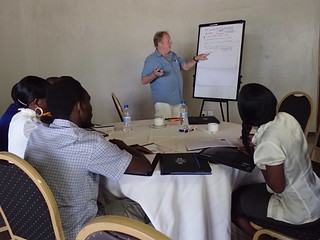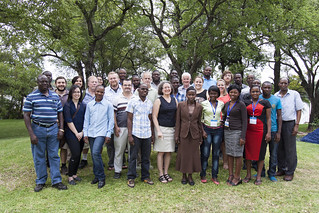Auburn University program promotes worldwide mathematics research in southern Africa
Article body
Overtoun Jenda made a promise that he would increase the presence of American mathematical research in Africa and capitalize on an opportunity to create U.S.-Africa collaboration through Auburn University and Southern Africa Mathematical Sciences Association, or SAMSA.
When Jenda, associate provost for Diversity and Multicultural Affairs and professor in the Department of Mathematics and Statistics, attended a conference in Dar es Salaam, Tanzania, in 2009 held by SAMSA, he was the only representative from the United States.
When he returned to Auburn, Jenda, along with Ash Abebe, A.J. Meir and Peter Johnson of the Department of Mathematics and Statistics, together with southern Africa mathematicians, began to brainstorm and developed what would become the Masamu Program, meaning mathematics in the southern African region.
The group submitted a proposal for funding to the National Science Foundation and received a grant for a two-year pilot program. The first Masamu Advanced Study Institute, or MASI, was held in 2011 in Livingstone, Zambia.
The program was so successful that the department approached the NSF for more support and was granted funding for an additional five years. The NSF funding covers the cost of U.S. participants, while African mathematicians use their own sources of funding and sponsorships.
"The main purpose of the program is to promote U.S.-African collaboration on research," said Jenda. "There are very good mathematicians in Africa, and the Masamu Program offers several research areas for faculty and students to work together."
Each year, a MASI event is held in one of the 15 participating countries: Angola, Botswana, Lesotho, Malawi, Mozambique, Namibia, South Africa, Swaziland, Tanzania, Zambia, Zimbabwe, Ethiopia, Kenya, Madagascar and Uganda.
The institutes allow students and faculty from around the world to form teams and share research in the areas of algebra and geometry, analysis and topology, coding theory and information theory, graph theory, epidemiological modeling, numerical approximation of solutions of partial differential equations, mathematics of finance and statistics.
Faculty including Abebe, Jenda, Johnson, Erkan Nane and Kevin Phelps, from the Department of Mathematics and Statistics, serve as research team co-leaders alongside mathematicians from Africa.
"In some areas such as epidemiological modeling, the Africans have different approaches, so it's very exciting to see how these researchers work together on problems," said Jenda.
At its start, the program consisted of 41 research faculty, but has grown to 57 and includes Africans, Canadians, Europeans and Americans.
"Our 2014 MASI in Victoria Falls, Zimbabwe, was the biggest yet, and more than half of the keynote speakers there were from Auburn," said Jenda. "A large group of Auburn students attended, and there is definitely an increase in participation from promising female mathematicians, too."
Masamu Program participants have published research findings, completed dissertations and theses, and received appointments to fellowship, postdoctoral and faculty positions in the United States and Africa all while making new academic connections across the world.
Jenda, director of the program along with Abebe and Johnson, co-directors, organize and plan all facets of the Masamu Program through the business office of the Office Diversity and Multicultural Affairs.
The 2015 MASI will be held Nov. 20-29 in Swakopmund, Namibia, and the directors anticipate more participation than ever.
"For the future, the biggest thing is how we can sustain this great program. We hope to make this a permanent part of the College of Sciences and Mathematics and Auburn University," said Jenda. "We're also working to come up with new and innovative ideas so we can get continued support from NSF and other sources."
For more information about the Masamu Program, go to https://www.masamu.auburn.edu.
Related Media
Media interested in this story can contact Communications Director Preston Sparks at (334) 844-9999 or preston.sparks@auburn.edu.
Auburn University is a nationally ranked land grant institution recognized for its commitment to world-class scholarship, interdisciplinary research with an elite, top-tier Carnegie R1 classification, life-changing outreach with Carnegie’s Community Engagement designation and an undergraduate education experience second to none. Auburn is home to more than 30,000 students, and its faculty and research partners collaborate to develop and deliver meaningful scholarship, science and technology-based advancements that meet pressing regional, national and global needs. Auburn’s commitment to active student engagement, professional success and public/private partnership drives a growing reputation for outreach and extension that delivers broad economic, health and societal impact.






